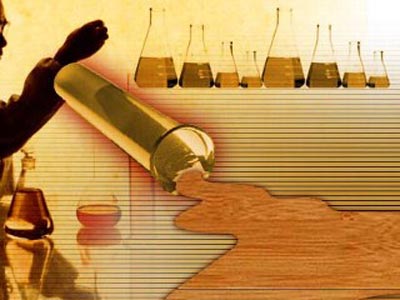'Liquid wood' will replace plastic
Plastic but can be biodegradable by the company Tecnaro, Germany, manufactured is considered a new milestone in the study of bioplastic materials.
40 years ago American scientists began to think about finding new materials to break human dependence on plastics. But in that time, plastics became so cheap and durable that people no longer cared about its harmful effects on the environment because plastics could not biodegrade in nature.

Newly awaited materials will replace plastics.
An alternative to plastic is lignin, a natural ingredient that makes the wood stem's durability. Lignin is present in the waste of paper manufacturing processes and has so far been treated by burning.
However, most American chemists gave up on the study of this new material in the late 1990s. Tecnaro recently announced that they found a secret formula to produce a kind of 'liquid wood' used. lignin, which can be molded like plastic but can decompose itself.
Over the weekend, the company launched small figurines made of 'liquid wood' surprising the bioplastic community. Under the name of Arboform, the material for making these statues is a mixture of high lignin content, sometimes up to 50% compared to the 30% threshold that many researchers set. The rest is made of wood, flax or hemp fiber and some additives.
The procedure for Arboform is very similar to plastic: raw pelletized Arboform is melted, placed at high pressure and poured into a hard mold. Benjamin Porter, a researcher working with Tecnaro, says that Arboform is much more moldy than most plastics when used for complex molds.
The Emilia Regina-Inone of the Franhoefer Chemical Institute, which collaborates with Tecnaro to test Arboform, says the sulfur content of this new material is reduced by up to 90% from the previous formula. Furthermore, it can be broken down and reused eight to ten times without compromising on physical characteristics such as relatively high durability and fire resistance.
But new materials also have limitations. All versions of Arboform are heavier, more brittle and more expensive than regular plastics. Arboform costs about $ 3.5 a kilogram when purchased in bulk, while the price of common polypropylene is only $ 2.2 a kilogram
Using this forgotten capital lignin potential not only helps reduce the amount of plastic emitted per year, but it also helps slow the current greenhouse gas emissions. In the trunk, the lignin is used to store carbon dioxide during photosynthesis, and the carbon is retained in the lignin emitted during the paper making process.
Tecnaro currently produces approximately 3,000 tons of Arboform each year, which increases by 10% annually. The number of product categories is also expanded and currently includes watches, keyboards, hair brushes, and recently containers. In the future the company can produce both automotive and household furniture.
However, Tecnaro kept the formula for its liquid wood material confidential.
- Video: Plastic welding equipment in a snap
- The scientist found a way to recycle plastic bottles into diesel
- America has found a way to turn plastic waste into cosmetics
- The end of the era of plastic garbage is probably coming soon, thanks to this invention
- Successfully manufactured biodegradable plastic materials
- Successfully refining high quality wood pulp of Vietnam
- Creating artificial wood can resist water and fire, producing faster than growing plants
- A small 3D printing device that can help build houses with plastic bottles is easier than ever
- Video: How to create a blade with plastic and wood cutting paper
- Detecting sawdust, wood, wood chips ... can help bond concrete more strongly
- 101 ways to replace plastic bags from the world experience
- How do food preservatives harm young children?
 Why do potatoes have eyes?
Why do potatoes have eyes? 'Tragedy' the world's largest carnivorous life: Death becomes ... public toilet
'Tragedy' the world's largest carnivorous life: Death becomes ... public toilet Tomatoes were once considered 'poisonous' for 200 years
Tomatoes were once considered 'poisonous' for 200 years Detecting microscopic parasites on human face
Detecting microscopic parasites on human face